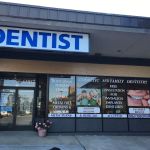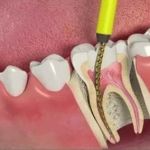Signs You Need a Dental Crown or Bridge
- Understanding Dental Crowns and Bridges
- Common Signs You Need a Dental Crown
- Common Signs You Need a Dental Bridge
- How Dental Crowns and Bridges Improve Dental Health
- When to Schedule a Consultation for Crowns or Bridges
1. Understanding Dental Crowns and Bridges
Dental crowns and bridges are two of the most common solutions for restoring damaged or missing teeth. They both serve to improve the functionality and appearance of your smile, but they have different uses. Understanding when and why you might need a crown or bridge is essential to maintaining good oral health.
A dental crown is a cap that encases a damaged tooth, protecting it from further damage while also improving its appearance. Crowns are typically used for teeth that are severely worn down, cracked, or have undergone significant decay. On the other hand, a dental bridge is used to replace one or more missing teeth. It spans the gap left by the missing teeth, anchoring onto adjacent teeth for stability.
Both treatments can significantly enhance your dental health, but recognizing the signs that indicate you need them can help you make informed decisions about your oral care.
2. Common Signs You Need a Dental Crown
There are several telltale signs that you might need a dental crown. These signs typically involve damage or decay that affects the function or appearance of your teeth. Here are some of the most common signs that indicate a dental crown might be necessary:
- Severe Tooth Decay: If a tooth has a large cavity that can’t be filled with a simple dental filling, a crown may be necessary to restore its strength and prevent further damage.
- Cracked or Broken Teeth: A cracked tooth can be painful, and without proper restoration, the crack could worsen. Crowns are used to cover and protect cracked or broken teeth from further damage.
- Worn Down Teeth: Teeth that are worn down due to age, grinding, or erosion might require crowns to restore their shape, size, and strength.
- Cosmetic Improvement: Crowns are often used to improve the appearance of discolored or misshapen teeth, especially when whitening or reshaping methods are not enough.
If you are experiencing any of these issues, it’s a good idea to consult with your dentist about the possibility of a dental crown to restore your tooth's health and function.
3. Common Signs You Need a Dental Bridge
A dental bridge is typically used when you have one or more missing teeth. It fills the gap left by the missing teeth and prevents other teeth from shifting out of place. Here are some common signs that indicate you might need a dental bridge:
- Missing Teeth: If you’ve lost one or more teeth due to injury, decay, or gum disease, a dental bridge can replace the missing teeth and restore your smile.
- Difficulty Chewing or Speaking: Missing teeth can make it hard to chew certain foods or speak clearly. A dental bridge helps restore the function of your mouth, making eating and speaking easier.
- Shifting Teeth: When a tooth is missing, the adjacent teeth may shift toward the gap, causing misalignment. A dental bridge helps prevent this shifting, keeping your teeth in proper alignment.
- Improved Aesthetics: Missing teeth can significantly affect the appearance of your smile. A dental bridge can fill in the gap and restore the natural look of your teeth.
If you have missing teeth and are experiencing any of these issues, a dental bridge might be the right solution to restore both function and appearance.
4. How Dental Crowns and Bridges Improve Dental Health
Dental crowns and bridges not only restore the appearance of your teeth but also offer significant health benefits. These restorative treatments can help improve your overall dental health by:
- Protecting Weakened Teeth: Crowns protect damaged teeth from further decay or fractures, ensuring that they continue to function properly for years to come.
- Preventing Shifting of Teeth: Dental bridges prevent surrounding teeth from shifting into the gap left by a missing tooth, which can lead to misalignment and bite problems.
- Restoring Full Functionality: Both crowns and bridges restore full functionality to your teeth, allowing you to chew and speak properly again.
- Reducing the Risk of Tooth Loss: By addressing issues like decay, cracks, or gaps early, crowns and bridges can reduce the risk of further tooth loss or complications.
By opting for dental crowns and bridges, you are not only improving the aesthetic appearance of your teeth but also enhancing their long-term health and functionality.
5. When to Schedule a Consultation for Crowns or Bridges
If you are experiencing any of the symptoms mentioned earlier, it’s important to schedule a consultation with your dentist. Early intervention can prevent further damage and reduce the need for more extensive treatments later on. Your dentist will conduct a thorough examination, discuss your treatment options, and help you decide whether a dental crown or bridge is right for you.
It’s also important to visit your dentist regularly for checkups and cleanings. During these visits, your dentist can catch early signs of damage or decay that might require crowns or bridges before they become more serious issues.
Don't wait until your tooth pain becomes unbearable. If you suspect you need a dental crown or bridge, schedule an appointment as soon as possible to address the issue before it worsens.
For more information about dental crowns, bridges, and other restorative treatments, visit Dentistry Toothtruth to find expert advice and resources to maintain a healthy smile.







 Maddison Ave Dental4.0 (83 review)
Maddison Ave Dental4.0 (83 review) Elite Dental Specialists, Joliet, IL4.0 (305 review)
Elite Dental Specialists, Joliet, IL4.0 (305 review) Brunswick Dental Group3.0 (71 review)
Brunswick Dental Group3.0 (71 review) San Fernando & Pacoima Family Dental4.0 (55 review)
San Fernando & Pacoima Family Dental4.0 (55 review) Mid-County Endodontic Group, P.A.5.0 (187 review)
Mid-County Endodontic Group, P.A.5.0 (187 review) Clove Dental Camarillo4.0 (225 review)
Clove Dental Camarillo4.0 (225 review) The Importance of Oral Health Education During Pregnancy for a Healthy Pregnancy
The Importance of Oral Health Education During Pregnancy for a Healthy Pregnancy Best Tips for Brushing Your Teeth Properly for Healthy Gums: Essential Techniques for Oral Health
Best Tips for Brushing Your Teeth Properly for Healthy Gums: Essential Techniques for Oral Health Why Skipping Dental Checkups Can Lead to Bigger Oral Health Problems
Why Skipping Dental Checkups Can Lead to Bigger Oral Health Problems Advantages of Porcelain Dental Restorations
Advantages of Porcelain Dental Restorations How Can Diabetes Cause Tooth and Gum Problems? Preventing and Managing Oral Health Issues
How Can Diabetes Cause Tooth and Gum Problems? Preventing and Managing Oral Health Issues Healthy Habits for Promoting Good Oral Health and Hygiene: Tips for a Healthy Smile
Healthy Habits for Promoting Good Oral Health and Hygiene: Tips for a Healthy Smile